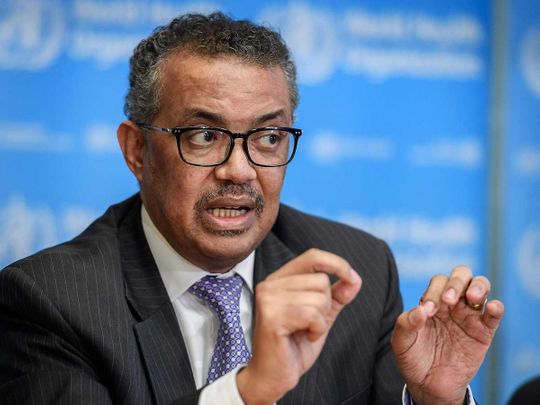
On Tuesday, President Trump formally began the process of pulling the United States out of the World Health Organisation, having accused the organisation of not holding the Chinese government to account for its handling of the coronavirus.
The withdrawal would not go into effect until next July. But the prospect of losing the United States as a member, far and away the WHO’s largest donor, is a big blow to the organisation, and comes just a day after 239 scientists in 39 countries wrote an open letter claiming its guidance on airborne transmission was outdated.
Trump’s criticisms of the WHO may be hypocritical, but many public-health experts and journalists say they are not entirely unfounded. What has the pandemic revealed about the organisation’s shortcomings, and how can they be remedied?
The WHO’s track record of responding to emergencies is uneven. While it boasts many momentous achievements — including the eradication of smallpox, the near eradication of polio, the development of an Ebola vaccine and a huge expansion of basic health care services in low-income countries — it also suffers from institutional sclerosis.
The World Health Organisation was founded as part of the United Nations in the wake of World War II, at the dawn of what some call Pax Americana, or the American Century. A product of that era’s heady faith in international cooperation, the WHO stated as its founding objective “the attainment by all peoples of the highest possible level of health.”
In practice, this broad mandate has translated to alerting the world to potential public-health threats, preventing the spread of diseases, and championing universal health care policy.
During emergencies like the coronavirus, the WHO is meant to act as a coordinating body, employing its 7,000 workers spread over 150 offices worldwide to organise a global response, guide containment, declare emergencies and make recommendations in cooperation with member nations.
If a vaccine is ever discovered for the coronavirus, the WHO will play an important role in coordinating its distribution and influencing its pricing.
But the WHO was never vested with any direct authority over its members, as Daniel Victor and Christine Hauser explain, so its mission often exceeds its abilities.
And like any governing body, the organisation is subject to budgetary and political pressures, especially from powerful nations like the United States and China, as well as from private funders like the Gates Foundation.
The WHO’s track record of responding to emergencies is uneven. While it boasts many momentous achievements — including the eradication of smallpox, the near eradication of polio, the development of an Ebola vaccine and a huge expansion of basic health care services in low-income countries — it also suffers from institutional sclerosis.
Sluggish response
The WHO’s sluggish response to the West African Ebola outbreak in 2014 was primarily responsible for the severity of that epidemic, which killed 11,000 people in two years.
The Obama administration was so displeased with the WHO that it largely bypassed the agency to coordinate its Ebola response with other countries.
AThe WHO’s communication about the evolving science of the virus had been drawing scrutiny well before this week.
From the beginning, the organisation was loath to recognise evidence that symptomless transmission was playing a significant role in the virus’s spread. Instead, Amy Davidson Sorkin writes for The New Yorker, the organisation dug its heels into semantic distinctions that were “terribly misleading.”
The WHO also initially refused to endorse masks for the public despite a growing body of evidence of their potential effectiveness. The WHO reversed its recommendation only in June, by which time virtually all scientists and governments had been recommending masks for months.
The WHO has been mired in political controversy, too, in large part because of its perceived deference to the Chinese government.
Doctors in China were raising the alarm that the coronavirus was potentially spreading from human to human as early as late December. Through the middle of January, however, the WHO continued to confirm Chinese officials’ claims to the contrary.
By the time a Chinese official publicly acknowledged the risk of human-to-human transmission on Jan. 20, the virus was already seeding in major Chinese cities and had reached Washington State.
The WHO didn’t declare a global health emergency for 10 more days, during which time the virus may have been spreading across the United States.
The timeline of the WHO’s response matters because of the exponential nature of the coronavirus’s spread. In New York City, for example, researchers have estimated that acting even a week or two earlier might have reduced cases by 50 per cent to 80 per cent. To prevent a similar calamity from occurring again, the Wall Street Journal editorial board argues, the WHO must either be reformed.
‘Still the world’s best hope’
Despite its flaws, the WHO has been proved a force largely for good over its 72-year life. But with an annual budget of only $4.8 billion, the organisation clearly does not have the resources to adequately serve its mission.
“It’s not a failed bureaucracy,” William Foege, a former director of the Centers for Disease Control and Prevention who worked on the international campaign to eradicate smallpox, told ProPublica.
“If you go there and see all they do every year, and they have a budget for the entire world that’s smaller than many medical centers in this country.”
The answer to this problem, the board says, it to give the WHO more power and funding, not less: “The United States and other member nations — like Brazil, which also recently threatened to leave the organisation — should try seeing the WHO for what it is: a reflection of the countries that created it and that wrote its bylaws. If they don’t like what they see, they should work to improve that reflection.”
More funding could also help the WHO become less dependent on China. Beijing’s influence is not primarily financial. Rather, it stems from Beijing’s talent for building coalitions within the organisation, which affords it significant sway over the body’s decisions. So in withdrawing funding, they argue, the United States would be forfeiting its primary point of leverage.
While the WHO has made some missteps during the pandemic, it has done well overall given its organisational constraints.
The WHO 2.0
Fixing the WHO begins with funding, but it won’t end there, writes Zeynep Tufekci in The Atlantic. “We must save the WHO, but not by reflexively pretending that nothing’s wrong with it, just because President Trump is going after the organisation,” she argues.
It needs to be restructured, and the first order of business is to make sure that it’s led by health professionals who are given the latitude to be independent and the means to resist bullying and pressure, and who demonstrate spine and an unfailing commitment to the Hippocratic oath when they count most.





